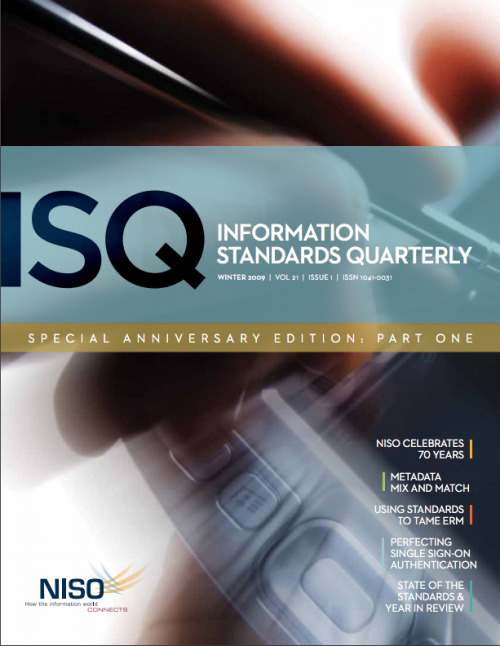Letter from the Editor
NOTE TO READER: Download the PDF of this issue.
Over the past year, ISQ has undergone some significant transitions, as it moved from a newsletter to a more inclusive magazine. It is fitting that we’ve made these changes to invigorate ISQ just as NISO is expanding its scope as an organization. You will notice that with this issue, we’ve listened to reader feedback and improved the design. Behind the scenes, we have restructured the editorial and production processes at ISQ. Cynthia Hodgson, a long-time member of the NISO standards development team, has been appointed Managing Editor. Jay Datema continues to solicit and contribute articles as Content Editor. We are continuing to expand and diversify the content and improve the information you receive in ISQ.
We start off this 70th anniversary year with two retrospective articles. The first is one in a series of timelines we will have in ISQ this year looking back on NISO’s first four decades. Part 1 covers the period from the organization’s founding through its formal non-profit incorporation in the 1980s. The second retrospective article is our annual review of NISO’s activities, reflecting on the work that was advanced in 2008. Looking forward, Jeremy Frumkin, Chair of NISO's Architecture Committee, discusses the strategic work that is underway by that committee.
This issue also includes an insightful feature article from Karen Coyle on metadata and the complexity of bibliographic data in a web-based world, focusing in particular on her work with the Open Library. Another feature by Abigail Bordeaux reviews the state of e-resource management and the need to streamline the processes that libraries use to administer their electronic collections. Jay Datema has contributed an editorial on usage measures and the impact that studying usage has had on our community. We have an editorial from NISO’s Board Chairman, Oliver Pesch, on his selection of single sign-on authentication as the Chair’s Initiative and a meeting report from a NISO webinar on this same topic.
NISO’s predecessor, the Z39 committee, was founded during a challenging era—the Great Depression. Today we are facing another difficult environment, with long-established companies and organizations struggling to stay afloat. So we are pleased that NISO can still engage the community on important issues and make a positive impact on information distribution. Libraries have long realized that sharing resources reduces costs. By focusing on NISO’s mission of developing standard methods for information distribution, management, re-use, and preservation, we can all succeed at doing more with a little less.
